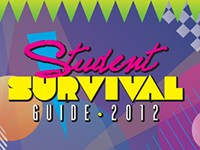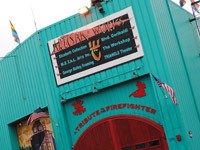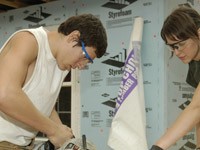I first came in contact with that daunting, incomprehensible piece of paper in elementary school. The vast combinations of letters and numbers seemed like a language I would never decode. Over the years, I encountered it again and again in the form of charts, posters, and projector slides. But no matter how I looked at it, I knew that the periodic table of elements and I may never come to an understanding. It's safe to say that chemistry has never been my best subject.
But even in college, when it comes to education, the ever-dreaded required courses have a way of trumping individual likes and dislikes. Despite my feelings on the subject, I too had to pick a chemistry class. As I flipped through the course catalogue, the introductory class seemed the most logical choice. But at the bottom of the class list, the word "environmental" caught my eye. The course was Environmental Chemistry. The level was higher, but I took the chance. It was the most interesting class I have ever taken (though I still can't say I'm a chemist).
With all of the new pressures you'll face, it's easy to turn on the blinders to everything college has to offer, and just focus on what's easy or expected.
"Take advantage of all of it," says Christopher Belle-Isle, director of the Career and TransferCenter at MonroeCommunity College. "The wonderful thing about [college] is that it's a whole new experience."
While you may have had some limited freedom in high school, in college it's truly up to the student to decide what to do with his or her time and educational opportunities. Belle-Isle explains that it's the activities you choose and the educational decisions you make that will shape the college experience, and eventually (ideally) your job.
When you first receive that thick course catalogue (or, more likely, an online version that seems to be endless despite your scrolling efforts), the class-selection process begins. Whether you've decided on a major, are considering a few, or have absolutely no idea, choosing classes for a semester can be an overwhelming experience.
"Having a broad education is important to your career and life," says Belle-Isle. He explains that no matter where your focus lies, students should branch out in terms of course selections. Use your school's academic structure, such as general education requirements, to your advantage.
Belle-Isle uses the example of humanities. While not all of us strive to be great writers or experts on literature, the skills that are developed in these types of classes will help any student to be successful in other aspects of their future, especially when it comes to employment.
But these decisions cannot be made for you, so it is important to be critical when choosing classes. "It all depends on what the student is trying to do," says Belle-Isle. "They can find the easy path." But if you challenge yourself, he says, "You will be more satisfied."
Creating a successful college experience involves more than the courses you take. Joining clubs, teams, or other extracurricular activities can provide opportunities that are just as important as classes.
A student of film or photography might consider joining a photography club. Though you already are taking classes, a club could give you a more open and creative outlet than you might get from just assignments. You'll also get to meet people with common interests.
Sometimes eager students look for that obvious connection and overlook other extracurricular opportunities. Take your college's radio station for example. Many students are under the impression that they must be interested in being in the radio business after graduation, but that's not the case. Though you are exposed to the technical aspects, joining your campus radio station is a great option for music lovers looking for an outlet, those that interested in writing, or even those looking to work on their public-speaking skills.
"Students will have a much more robust experience," Belle-Isle says of getting involved on and off campus. "They will benefit from it later on in life, they will understand communication and have much more broad-thinking capacities."
These out-of-the-classroom experiences can also directly impact your career and job outlook. Claire Van Den Berghe, director of career services at SUNY Brockport, explains that actively seeking out extra opportunities -- especially internships -- will not only help with employment, but also help you to grow.
"I think it's critical," she says. "We deal with a lot of employers that have internship opportunities, and even if [a student] is just a freshman, it's good to start interacting with employers and internships."
Internships and co-ops are also key to a student's personal growth. "Students get a feel for what they want to do," Van Den Berghe says. "We like to tell students that, if they can, do more than one [internship]."
"Any experiences that push students along in their development are great," she says. By taking part in extracurricular activities, Van Den Berghe says that students are learning three key experiences: leadership, communication skills, and teamwork.
Van Den Berghe also urges students to do what they love, even if it isn't directly connected to their career path. She explains that Brockport has a dance major, but there are many students who love dancing and do not want to pursue it academically. Joining the dance club is a good opportunity for students that want to continue dancing while participating in an activity outside of the classroom.
If you have absolutely no idea what you want to be, or what you should be doing, don't panic. Colleges have several facilities as well as faculty members to help guide you along your path. Most importantly, remember that you are never locked into a choice, no matter what you decide. Belle-Isle says that although you should be actively looking for a possible career path, "it doesn't mean you can't change your mind."
"Students think they have to know exactly what they want to do," he says. But that simply is not the case. He recommends that if students have questions about what they're doing or where they're going, they should seek assistance from an academic advisor, or set up an appointment with a career counselor. "That will help you know who you are and what your strengths are," he says.
Van Den Berghe recommends that new students and students unsure about their long-term goals should get acquainted with the administrative side of campus and services. She explains that the college faculty and staff really are there to help, no matter if you are unsure or have completely changed your mind.
Ultimately, if you want a great college career, much of it is up to you. But for guidance, you need only ask. Van Den Berghe's biggest piece of advice is to freshmen is to "get involved, get engaged with other students and faculty, and get buckled down so you can be successful."







